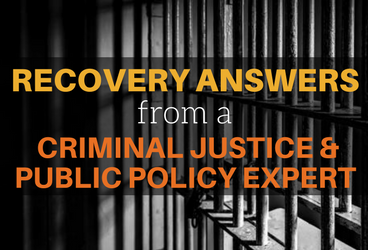
January 5, 2018 |
Work Hard, Play Hard: One Prosecutor’s Story of Addiction and Recovery
By Susan Broderick

I was recently invited to speak at the New York Prosecutor’s Capital Conference in Albany. Having served as a prosecutor in Manhattan for 14 years, I was excited about the opportunity to go back and see some of my former colleagues. While the agenda was primarily focused on current legislative criminal procedure changes, I was speaking on a completely different topic – my addiction and recovery from alcohol use disorder.
I was a “work hard, play hard” prosecutor and did both fairly well, until the “playing” began to take its toll. While I never drank during the day or at work, I definitely used alcohol as both a social crutch and as a way to take the edge off of a rough day. The problem is, when you are dealing with homicides, sex crimes and child abuse, there are a lot of rough days.
What initially started as a way to socialize with my colleagues, slowly and subtly turned into a nightly ritual alone in my apartment.
Happy hours and conviction celebrations were replaced with daily stops at Michael’s wine shop after I came home off the subway.
Evidently however, I am not alone. It turns out, that alcohol addiction is a widespread problem throughout the legal profession. A recent study found that between 21 to 36 percent of the nearly 13,000 lawyers surveyed qualified as problem drinkers. Not surprisingly, approximately 28 percent, 19 percent, and 23 percent struggle with some form of depression, anxiety and stress, respectively.
Equally troubling was the finding that only a small-percentage indicated they were willing to seek help, due in part to the stigma surrounding these issues. Unfortunately, for those with an addiction and/or mental health issue, not seeking help can cause more work-related problems than admitting that there is a problem and seeking help.
For many lawyers, denial remains a major factor. Individuals may look at the fact that they are still employed, haven’t lost their homes, and are still “functioning” as proof that a problem does not exist. Unfortunately, the reality is that addiction is insidious and can progress in severity even with a large case load.
For many years, I continued drinking even when problems began to arise, in a mix of fear and denial. I couldn’t imagine a life without alcohol, yet I was becoming increasingly ashamed about things I would do when I drank. I rationalized my drinking by the fact that I had not gotten a DWI, neglecting to consider the fact that I didn’t own a car in NYC.
The bottom line is that “functioning,” does not mean that there isn’t a problem.
Someone suffering from depression may try to appear to be “fine” on the outside, but inside they could be falling apart. Addiction and mental health issues don’t care where you sit in the courtroom – on the bench, at the prosecutor’s table, or in the audience – they are equal opportunity destroyers.
If we are going to have a real impact on addressing substance use disorder among legal professionals, we will need to increase awareness and understanding of the nature and warning signs of addiction. Perhaps even more critical, we will need to look at treatment and recovery solutions.
SUBSTANCE USE DISORDERS
There have been significant scientific advances with regard to understanding the nature and progression of substance use disorders. As set forth by the Surgeon General’s Report, science has confirmed that repeated and regular misuse of alcohol and/or drugs may lead to the development of a substance use disorder (SUD). What was long considered a moral failing or character flaw is now understood to be a chronic disease characterized by significant impairments of health, social function and voluntary control over use.
Click for diagnostic criteria of substance use disorder.
For many years I knew that I had a problem with alcohol, but I still could not imagine a life without it. I was so sure that I had a problem, I avoided looking at any questionnaires or tests that would measure my drinking. I knew it on a gut level, but was not ready to admit it. For many people, especially for those in denial, looking at these indicators can be a wakeup call, if not enlightening, and life-saving.
MENTAL HEALTH & SUICIDE ISSUES
Beyond substance us disorder, the statistics regarding depression and suicide among lawyers are staggering as well. According to data from the Centers for Disease Control (CDC) lawyers are the fourth most suicidal profession after dentists, pharmacists, and physicians. Fortunately, there are many resources available to help those who may be suffering or know someone who might be.
Click here for a list of warning signs for risk of suicide.
A few years ago I lost one of my former colleagues to suicide. He was such a wonderful man and one of my many old “drinking buddies” in the office. To be honest, when I heard the news about his death, I wasn’t completely shocked. After becoming abstinent, I had avoided what I had anticipated to be awkward conversations with him. Looking back, saving a life should always trump awkwardness. Just letting someone know that you care is a step in the right direction, and there are resources available to help make that conversation easier.
THE GOOD NEWS
While topics such as addiction and depression can feel overwhelming, the good news is that these issues are finally being addressed publicly.
The American Bar Association (ABA) recently released recommendations contains practical recommendations, state action plans, and sets forth five central themes:
- Identify Stakeholders and the role that each can play in reducing toxicity in the profession.
- Ending the stigma surrounded help-seeking behaviors.
- Emphasizing that well-being is an indispensable part of a lawyer’s duty of competence.
- Expanding educational outreach and programming on well-being issues. This included educating lawyers, judges and law students on recognizing mental health and substance use disorders as well as navigating the practice of law in a healthy manner.
- Changing the tone of the profession and prioritize health, resilience and self-care
We now also know much more about the risk factors associated with substance use disorders, which include early age of first use, genetic predisposition, amount, frequency and duration of misuse. When I first got sober, I realized that I had almost all of these – I started at 14, have a long family history of alcohol use disorder, and drank for multiple years.
Perhaps most importantly, we know that people can and do get better. The stigma and shame surrounding addiction and mental health disorders are being replaced by new advances in identifying critical and essential components that enhance long-term recovery outcomes (e.g. recovery capital and recovery oriented systems of care).
The concept of recovery capital is especially pertinent to the legal profession, as it focuses on the internal and external assets that exist to help initiate and sustain recovery. These include such things as pre-existing jobs, family and social relationships, education, skills and income. All of these elements can play a critical role in how we recover.
For a very long time I was amazed at the fact that I was able to stop drinking on July 15, 2001. I did not have to go away to treatment and I was able to make some pretty major changes in my life through connecting with others in recovery. I now know that this was because I was fortunate to have many of these elements of recovery capital already in my life. The fear of my career being ruined by seeking help for my alcohol use disorder was an illusion. Since being sober, my career has flourished, primarily because it allowed me to work at my true capacity. Not only has my sobriety made me a better lawyer, but it has also made me a better daughter, sister, friend and colleague.
We need to shine a light on the fact that people can and do recover from addiction and mental illness. Seeking help is not a sign of weakness, it is quite frankly one of the bravest things a person can do.
Susan Broderick, J.D., is an Associate Research Professor at Georgetown University and Project Director of the National Juvenile Justice Prosecution Center. She was an Assistant District Attorney in Manhattan, N.Y., from 1989 to 2003.
Editorial Contributions by: Alexandra Plante
